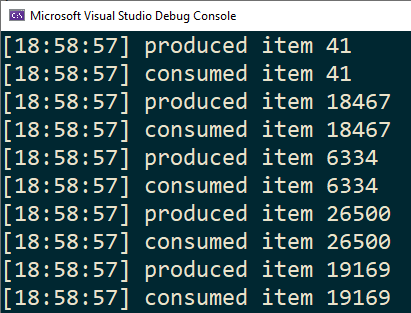Untuk mengantisipasi dimulainya kursus "Pengembang C ++. Profesional", kami mengundang Anda untuk mendaftar ke webinar terbuka dengan topik "Backend dalam C ++ modern".
Kami juga membagikan terjemahan tradisional dari materi yang bermanfaat.
C++20 . — , . , - :
co_await
,
co_return
, ()
co_yield
,
. C++20 , , . , , . , cppcoro.
cppcoro
C++20, (task
), (generator
) async_generator
. , ( , (awaited)), — T, ( begin()
, , ++
).
. produce_items()
, co_yield
cppcoro::generator<std::string>
, -.
#include <cppcoro/generator.hpp>
cppcoro::generator<std::string> produce_items()
{
while (true)
{
auto v = rand();
using namespace std::string_literals;
auto i = "item "s + std::to_string(v);
print_time();
std::cout << "produced " << i << '\n';
co_yield i;
}
}
:
rand()
. .
, , co_yield
. , . :
#include <cppcoro/task.hpp>
cppcoro::task<> consume_items(int const n)
{
int i = 1;
for(auto const& s : produce_items())
{
print_time();
std::cout << "consumed " << s << '\n';
if (++i > n) break;
}
co_return;
}
consume_items
. co_return
, — cppcodo::task<>
, . n , for
. begin()
cppcoro::generator<std::string>
, , ++
. produce_items()
() . , , begin()
++
. produce_items()
, .
consume_items()
main()
. , main()
, co_await
. , cppcoro syncwait()
, awaitable
( ). coawait. .
, require_items()
main()
:
#include <cppcoro/sync_wait.hpp>
int main()
{
cppcoro::sync_wait(consume_items(5));
}
:

cppcoro::generator<T>
, . , co_await
, , . cppcoro cppcoro::async_generator<T>
, .
: , , next_value()
. , . produce_items()
, . — cppcoro::async_generator<T>
.
#include <cppcoro/async_generator.hpp>
cppcoro::task<int> next_value()
{
using namespace std::chrono_literals;
co_await std::chrono::seconds(1 + rand() % 5);
co_return rand();
}
cppcoro::async_generator<std::string> produce_items()
{
while (true)
{
auto v = co_await next_value();
using namespace std::string_literals;
auto i = "item "s + std::to_string(v);
print_time();
std::cout << "produced " << i << '\n';
co_yield i;
}
}
, . co_await
for
:
cppcoro::task<> consume_items(int const n)
{
int i = 1;
for co_await(auto const& s : produce_items())
{
print_time();
std::cout << "consumed " << s << '\n';
if (++i > n) break;
}
}
co_return
, . co_await
for
, . co_return
, cppcoro::task<>
, , return
, void
. , co_await
, , co_return
, .
main()
. , , , :

, print_time()
, , :
void print_time()
{
auto now = std::chrono::system_clock::now();
std::time_t time = std::chrono::system_clock::to_time_t(now);
char mbstr[100];
if (std::strftime(mbstr, sizeof(mbstr), "[%H:%M:%S] ", std::localtime(&time)))
{
std::cout << mbstr;
}
}
, , — , co_await
. co_await
. Windows :
#include <windows.h>
auto operator co_await(std::chrono::system_clock::duration duration)
{
class awaiter
{
static
void CALLBACK TimerCallback(PTP_CALLBACK_INSTANCE,
void* Context,
PTP_TIMER)
{
stdco::coroutine_handle<>::from_address(Context).resume();
}
PTP_TIMER timer = nullptr;
std::chrono::system_clock::duration duration;
public:
explicit awaiter(std::chrono::system_clock::duration d)
: duration(d)
{}
~awaiter()
{
if (timer) CloseThreadpoolTimer(timer);
}
bool await_ready() const
{
return duration.count() <= 0;
}
bool await_suspend(stdco::coroutine_handle<> resume_cb)
{
int64_t relative_count = -duration.count();
timer = CreateThreadpoolTimer(TimerCallback,
resume_cb.address(),
nullptr);
bool success = timer != nullptr;
SetThreadpoolTimer(timer, (PFILETIME)&relative_count, 0, 0);
return success;
}
void await_resume() {}
};
return awaiter{ duration };
}
Coroutines in Visual Studio 2015 - Update 1.
: . .
, :
C++20 Coroutines
Exploring MSVC Coroutine
Coroutine Theory
C++ Coroutines: Understanding operator co_await
C++ Coroutines: Understanding the promise type
"C++ Developer. Professional".
"Backend C++".
